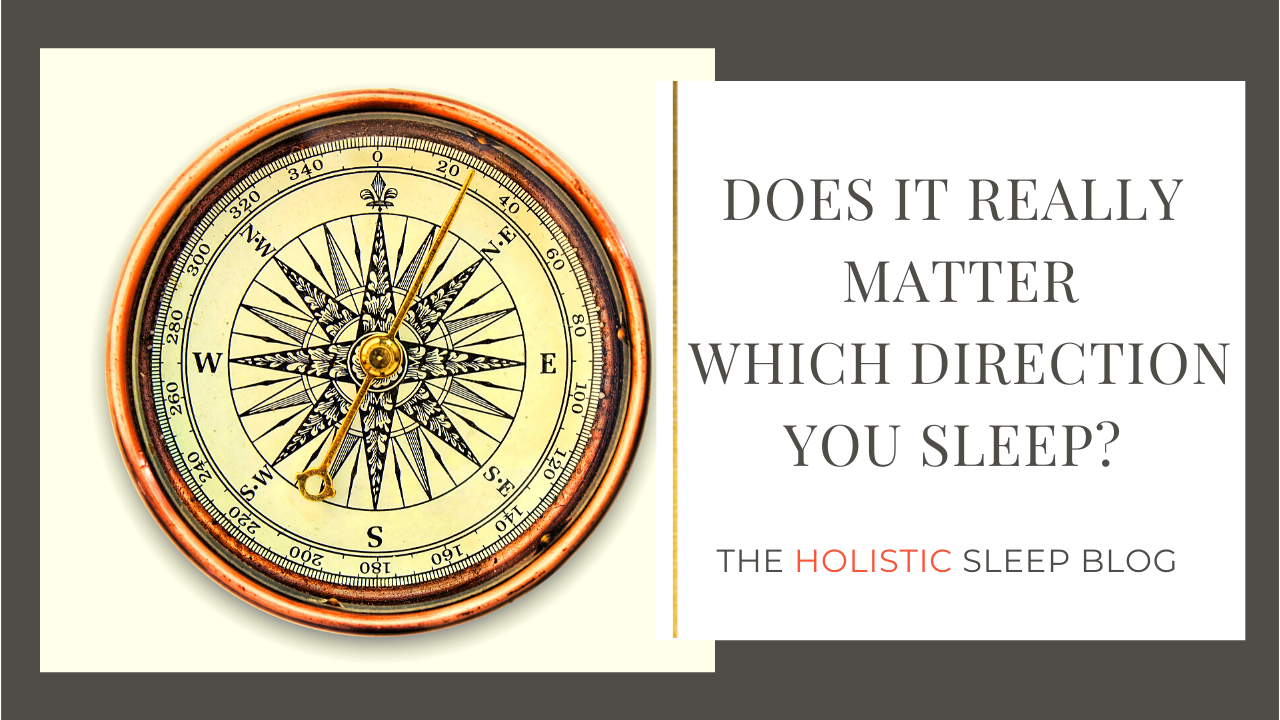Does It Really Matter Which Direction You Sleep?

What is the Best Direction to Sleep?
I recently bought a condo.
After six years of living in a studio the size of a postage stamp to recover from chronic illness, I’m going ALL OUT decorating this new home. (Think West Elm meets Joss & Main meets Marie Kondo.)
It’s a small, but powerful space with a good size bedroom. But I'm stuck on where to put the bed.
I've basically got two options:
→ Option One: the most aesthetically pleasing wall, which puts my head facing NORTH
→ Option Two: the feng shui-approved wall, which has my head facing SOUTH.
So of course I did a deep dive.
Does Sleeping Direction Matter?
You might be wondering… does any of this really influence sleep?
Well, there are a lot of ancient philosophies that say yes. (And maybe, like me, you’ve also felt the pressure to pick the “right” position and avoid the “wrong” one.)
So let’s explore it.
Because whether or not direction matters physiologically, it’s what we believe about these things — and how safe or unsafe we feel in our space — that tends to have the greatest impact on sleep.
More on that soon.
Sleeping North: Myth, Fact or Meaning?
The idea that sleeping with your head to the north is “bad” comes mainly from feng shui, Vastu Shastra, and certain cultural traditions.
Both systems emphasize the importance of harmony with the Earth’s natural energy flow (which I LOVE).
According to these teachings, sleeping north disrupts that flow. Possibly due to the Earth's magnetic field interacting with the iron in our blood.
Who knew?
Some say this creates internal dissonance — two positive poles repelling — which might lead to poor rest or waking unrefreshed.
In Japanese tradition, sleeping with your head north is linked to funerary rites. (So… not exactly restful vibes.)
But let’s pause here.
Because whether or not you buy into the magnetic field theory, there’s something super important to call out:
Our perception creates our experience.
When it comes to sleep, what we believe about it, and whether our nervous system feels safe, is often way more powerful than any external circumstance.
That’s the whole foundation of my approach.
Humans as Compass Creatures
There’s also research showing that many animals align their bodies with the Earth’s magnetic field. This includes fish, reptiles, and bees (my all-time favorite). It’s theorized we may have similar internal compasses, too.
Kind of cool, huh?
But again... is this internal compass about magnetism? Or about how safe and aligned we feel in our space?
Maybe it’s both. But perception holds the key.
Feng Shui Sleep Directions, Simplified
Feng shui suggests that direction affects energy flow, mood, and even life outcomes:
Head West: Contentment but possible laziness
Head East: Ambition, creativity, fresh starts
Head South-East: Communication and clarity
Head South-West: Peace and groundedness
Head North-East: Anxiety or restlessness
Head North: Tranquility for elders; potential sleep disruption for others
Head South: Strong energy; sometimes too intense
You’ll see some overlap with Vastu Shastra, which adds a spiritual layer. For instance, in Vastu:
North = soul exit route (used for lucid dreaming or astral work)
South = best for deep, restful sleep
East = clarity, learning, and meditative rest
West = ambition or neutral depending on interpretation
Again, these teachings emphasize alignment with nature — which is lovely. But none of them are prescriptive rules.
So, What Does the Research Say?
Unsurprisingly, there's not a ton of research on this quandary. A few small studies suggest possible differences in sleep quality depending on direction:
One 2015 study found that north-south sleepers reported better sleep quality
A 1987 study suggests that east-west sleepers had shorter REM latency.
But research is sparse and mixed. And honestly, this is where I lean back into the inner compass.
What matters most isn’t the direction. But whether it helps you feel safe, supported, and less identified with a fear of not sleeping.
My Personal Takeaway (and Bed Placement Decision)
This interesting foray into the world of sleep directions hasn’t made my personal dilemma any easier.
So, where does that leave my bed?
Here’s the truth: I don't believe sleep is created by routines, perfect positioning, or even ancient teachings.
It’s created by a body that feels safe enough to let go.
I’ve helped hundreds of clients shift their relationship with sleep, and I’ve seen again and again:
The biggest improvements happen when we stop externalizing the source of sleep and start trusting the internal system that’s always known how to do it.
I also believe that spaces hold energy — and when we arrange our environment in ways that light us up and feel good, that energy reflects inward.
So even though the “death position” label gave me pause, I’m going with north. Because it feels the best to me. The room flows better, the light feels right, and it aligns with how I want to feel when I walk into my bedroom.
And if it starts to feel off? Well, I’ll just change it.
Because I can. (#adulting)
Sleep doesn’t come from doing everything right. It comes from trusting your own body and believing in your own resilience.
Always in support,

Beth Kendall MA, FNTP
Holistic Sleep Coach
Health Disclaimer: The information and other content provided in this blog, or in any linked materials, are not intended and should not be construed as medical advice, nor is the information a substitute for professional medical expertise or treatment.
Tired of doing everything imaginable and getting nowhere with your sleep?
Get my FREE EMAIL COURSE and learn:
- Why there's no mystery to insomnia
- The most important thing to know about sleep
- Why sleep hygiene doesn't work
-How to create a "sleeper's identity"
- The ONE (and only) thing you need to sleep
-Why most sleep programs miss the mark
- The biggest myths about sleep
- How to end insomnia for good
I take the guesswork out of insomnia so you don't have to figure it out anymore.
Enter your name and best email to start right NOW.



